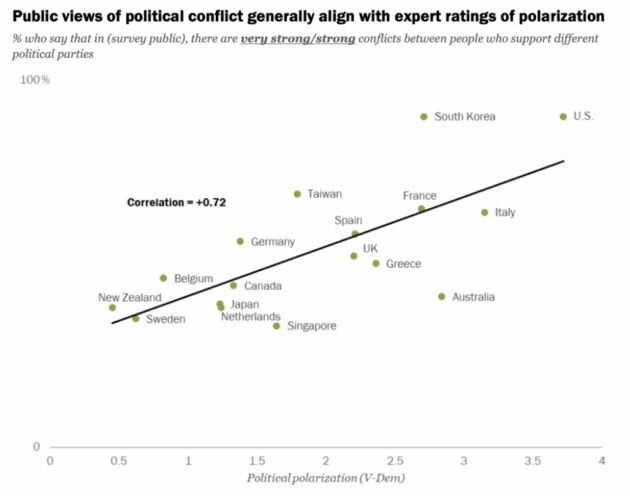Bryce Edwards
Victoria University Of Wellington – Te Herenga Waka
democracyproject.nz
Dr Bryce Edwards is Political Analyst in Residence at Victoria University of Wellington. He is the director of the Democracy Project.
The heat is rising in New Zealand politics and society at the moment. Protests and frustration with the Covid policies suddenly appear to be dividing society. Other tensions relating to inequality, ethnicity, religion, and the environment also appear to be polarising many New Zealanders.
However, there is some recent research on New Zealand and other advanced economies to show that this country is relatively harmonious. The Pew Research Centre has just released its report, “Diversity and Division in Advanced Economies”, about political polarisation in seventeen advanced economies. This shows the results from its Global Attitudes Survey about tensions between groups and politics in different countries.
The results for New Zealand suggest that compared to similar countries, the public here feels that conflict and tensions are relatively low.
Below are some particularly interesting results for New Zealand. In this, New Zealand’s survey results are compared with those for the United States, which appears to be more troubled by polarisation.
PARTISAN CONFLICT
New Zealand has very low levels of conflict between supporters of different political parties according to those surveyed. Whereas in the US, 90% believe that there is either strong or very strong conflicts between people who support different political parties, in New Zealand only 38% believe that – the third lowest country in the survey. Only Singapore and Sweden have less conflict according to survey participants. See the chart, below.

POLITICAL POLARISATION
In reporting the above levels of polarisation as determined by the survey of public perceptions, the Pew Research Centre report also compares this to results from a survey of experts in the various countries. This information from a separate survey is very much in line with the results – and can be seen in the graph below.
For New Zealand, the survey of experts suggests that New Zealand has a very low polarisation score of only 0.45 out of 4. This compares to the United States, which is judged to have a polarisation score of 3.72 out of 4. In this 0-4 scale, 0 means that “Supporters of opposing political samples generally interact in a friendly manner” and 4 equates to “Supporters of opposing political camps generally interact in a hostile manner.”

DISAGREEMENT OVER FACTS
One key measure of political and society dysfunction is the extent to which people disagree over the facts that are being debated – whether it’s climate change, Covid, or inequality. Measures of disagreement over basic facts are something of a proxy for levels of polarisation.
On this measure, New Zealand does very well in the survey, having only 18% – the lowest proportion in the seventeen advanced countries – believing that there is disagreement about basic facts. This compared to 59% in the US. See the chart, below.

DIVERSITY
Diversity of ethnicity, race and religion and welcomed by New Zealanders according to the survey. 88% think diversity makes NZ a better society, which is the 2nd highest amongst advanced economies. Only 9% think such diversity makes this country worse off, which is the lowest number in the survey of seventeen countries.
ETHNIC CONFLICT
New Zealand has very low perceived conflict between people with different ethnic or racial backgrounds. Whereas in the US, 72% believe that there is either strong or very strong conflicts between different ethnic or racial groups, in New Zealand only 38% believe that – the second lowest country in the survey. See chart, below.
RELIGIOUS CONFLICT
New Zealand has very low perceived conflict between people who practice different religions. Whereas in the US, 49% believe that there is either strong or very strong conflicts between who practice different religions, in New Zealand only 25% believe that – the third lowest country in the survey.
URBAN VS RURAL CONFLICT
New Zealand has very low perceived conflict between those who live in cities and people who live in rural areas. Whereas in the US, 42% believe that there is either strong or very strong conflicts between who practice different religions, in New Zealand only 21% believe that – the third lowest country in the survey.
It’s very important to note that the New Zealand public was surveyed for this report in early 2021, and this was a time when Covid was believed to have been eliminated, and the Delta variant hadn’t yet arrived in the community.
It’s possible that the public was therefore still in a mood of national unity and harmony, as it was during the second half of 2020, when Covid had been vanquished, and the ruling Labour Party had been rewarded with its historic election win. Since then, however, it’s possible that social and political divisions have returned and political polarisation might now be significantly higher than what is recorded in the above information.
The report’s summary by authors Laura Silver, Janell Fetterolf and Aidan Connaughton can be read here: Diversity and Division in Advanced Economies.
This article can be republished under a Creative Commons CC BY-ND 4.0 license. Attributions should include a link to the Democracy Project.
Please share this article so that others can discover The BFD.

